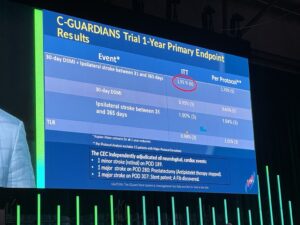 New data from the C-GUARDIANS pivotal investigational device exemption (IDE) trial support consideration of carotid artery stenting (CAS) with the CGuard embolic prevention stent system (EPS; InspireMD) as a “frontline therapeutic option for appropriate patients being considered for carotid revascularisation”. This is according to lead investigator Chris Metzger (OhioHealth, Columbus, USA), who presented one-year results from the trial at the Leipzig Interventional Course (LINC) 2024 (28–31 May, Leipzig, Germany).
New data from the C-GUARDIANS pivotal investigational device exemption (IDE) trial support consideration of carotid artery stenting (CAS) with the CGuard embolic prevention stent system (EPS; InspireMD) as a “frontline therapeutic option for appropriate patients being considered for carotid revascularisation”. This is according to lead investigator Chris Metzger (OhioHealth, Columbus, USA), who presented one-year results from the trial at the Leipzig Interventional Course (LINC) 2024 (28–31 May, Leipzig, Germany).
Metzger detailed that this was a prospective, multicentre, international, single-arm clinical trial comparing the primary endpoint to a performance goal derived from the literature.
The objective was to evaluate the safety an efficacy of the CGuard in the treatment of carotid artery stenosis in symptomatic and asymptomatic patients at high risk for carotid endarterectomy (CEA) undergoing CAS.
From July 2021 to June 2023, 316 patients were prospectively enrolled in the study at 24 sites across the USA and Europe.
The primary endpoint of the trial was a composite of: (1) incidence of major adverse events including death (all-cause mortality), any stroke, or myocardial infarction (DSMI) through 30-days post index procedure, or (2) ipsilateral stroke from day 31 to day 365 post-procedure.
Metzger revealed at LINC 2024 that stenting with the CGuard in patients with carotid artery stenosis and at high risk for CEA had a primary endpoint event rate of 1.95%, from procedure through one-year follow-up.
The presenter commented that the data are consistent with previously published European data.
“We are very excited that the one-year carefully adjudicated C-GUARDIANS data confirm the extremely low rates of stoke, death, myocardial infarction, and target vessel revascularisation in this prospective trial of high-CEA-risk patients with obstructive carotid disease, including 25% who were symptomatic,” Metzger stated in an InspireMD press release announcing the results. “These data confirm the potential ‘neuroprotective properties’ of this unique MicroNet technology, offering an outstanding frontline option to consider for each patient with obstructive carotid artery disease.”








